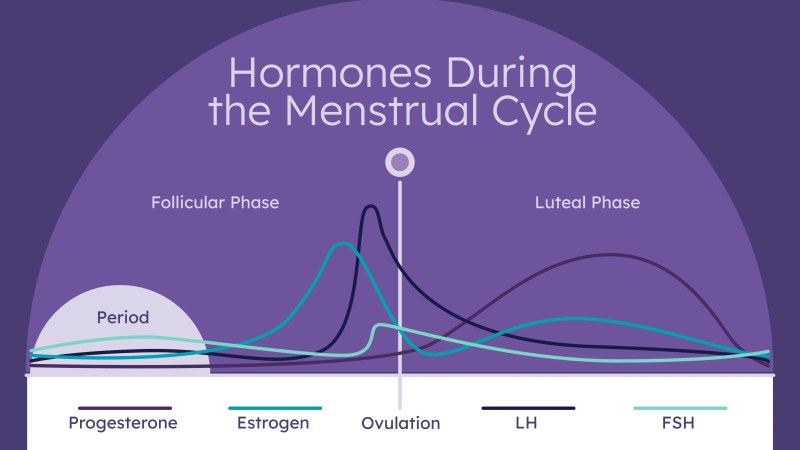If I Miss My Period When Will I Ovulate – We’ll clear up any misconceptions about normal and irregular periods and how they relate to ovulation and conception.
Although ovulation and periods naturally go together, it is possible to ovulate without having a period. This usually happens to women who have irregular periods. On the other hand, it is possible to bleed every month without ovulation. However, this bleeding is irregular and is caused by an anovulatory cycle. While this may sound confusing, it becomes clear once you understand how ovulation works.
If I Miss My Period When Will I Ovulate

Assuming a normal 28-day menstrual cycle, a healthy woman not using hormonal birth control will ovulate on day 14 of her cycle. During ovulation, the ovaries release a mature egg that is ready for fertilization. After the egg is released, it lives between 12 and 24 hours. If the egg is not fertilized, it breaks and penetrates the lining of the uterus, called the endometrium.
Why Is My Period Late?
Two weeks after ovulation, the uterine body leaves the vagina in the form of menstrual blood. This is called a “true period” because the blood comes from the cervix, uterus, and blood.
Also, since your period is triggered by ovulation, it’s common to ovulate without having a period, but it’s not impossible. Things like uterine inflammation or pregnancy can prevent your period from happening.
If you’ve had a cerebrovascular accident (D&C), C-section, or miscarriage, you may have a scar on your uterus. If so, normal thickening of the uterine lining does not occur after ovulation. You may ovulate without having a period, or you may have a light period.
You can also ovulate without a period if your ovaries release an egg 12 to 16 days before you expect your period to start.
How To Get Periods Immediately In One Hour?
It’s easier to conceive if you have regular periods. If you have irregular periods, contact your OB-GYN to determine the cause and begin appropriate treatment. Even if you don’t have regular periods, you should use a contraceptive method if you don’t want to get pregnant. OTC ovulation predictors can help you plan your fertile days easily.
We look forward to talking with you about menstruation, ovulation and all your women’s health issues. Contact us today to schedule an appointment with one of our doctors.
We use cookies to make sure we give you the best experience on our website. If you continue to use this website we will assume that you are satisfied with it. ❤️ The problem with Ok’s Privacy Policy is that at some point in your life, you’re going to run out of time. However, when it does, it can cause confusion or worry, especially if it happens frequently.

And the search for answers can sometimes be even more confusing. That’s why we’re here: to demystify your hormones and help you understand what’s normal, what’s not, and what steps you need to take.
Did You Know That Late Or…
The long answer: Because we know “maybe” isn’t very helpful, it depends on a number of things, including your age and general health.
If you started menstruating a few years ago, yes, it’s probably normal to miss a period! Your body is still learning how to cycle and your hormone levels may not be up to par yet.
On the other hand, if you are older and close to menopause, you may start to miss your period. Your cycles may be long and irregular, and this will make you feel like you’re out of time.
However, if you’re in your 20s to 40s, the “prime years of fertility,” a lack of periods is often a sign of an underlying problem with ovulation or hormonal health. Frequent missed periods are called amenorrhea and can have several causes other than pregnancy.
Chances Of Getting Pregnant After A Positive Ovulation Test
If you find yourself in this situation, read on to learn why you get your period and what you can do about it.
In reality, wasting time is more than your time. This is because your period is ultimately caused by hormonal activity throughout your cycle, including ovulation.
During the first half of the cycle, the follicular phase, estrogen increases and causes the lining of the uterus to thicken. The rise in hormones also leads to ovulation, or the release of an egg.
After ovulation, during the second half of the cycle (the luteal phase), progesterone increases and helps maintain the lining of the uterus in preparation for pregnancy.
Can You Take A Pregnancy Test While On Your Period?
Finally, at the end of the luteal phase (which is usually a fixed length) progesterone drops through the lining of the uterus, and it’s your turn!
So you can see, in order to get your period, there are a lot of things that have to go right first, including rising estrogen, rising LH, ovulation, and rising progesterone during your period luteal phase.
If you miss a period and know you’re not pregnant, it probably means you haven’t ovulated. If you track your ovulation, you can tell you haven’t ovulated and know you haven’t missed your period, it’s just late.
Or, if you’re tracking ovulation and you know you’re ovulating, it might be time to take a pregnancy test.
Ovulation And Pregnancy: Everything To Know
If irregular periods are often caused by missed ovulation, what could be the cause? And what does it mean for you and your health? For the rest of this article, we’ll talk about the most common reasons for downtime and what steps you can take.
Pregnancy is the main reason why people suspect they have missed their period. The reason is that when the egg is fertilized and implants in the wall of the uterus, the lining of the uterus never sheds and helps the pregnancy grow.
If you’re not sure whether you’re ovulating or not, or think you’re pregnant, a pregnancy test is a good idea. Standard pregnancy tests require you to wait until the day you expect your period, but you can test up to five days earlier with Proov Check.

Stress is another common reason for missed or delayed ovulation, especially if it’s only occasionally. Periodicity, or not ovulating, is actually quite common; it’s estimated that up to a third of cycles are actually “anovulatory!”
Why Is My Period Late
Your body needs a lot of resources to prepare for pregnancy, so when you’re stressed, your body may choose to conserve those resources and delay ovulation. If you have chronic stress, you may miss several periods, and this may be a sign that you need to take more steps to manage your stress.
Making changes to reduce stress, sleep better, or completely reduce the cause of your stress will help you regain control of your cycle. If the stress is severe, we recommend that you consult your doctor.
PCOS is a condition that affects the ovaries and often causes urination. Symptoms include missed periods, weight gain, body hair and insulin resistance, and 1 in 20 women may have PCOS.
For more information, see our previous blog Understanding Your Fertility with PCOS to learn why PCOS causes anovulation and what you can do specifically.
Is It Normal To Miss Periods?
Weight can affect your period in two main ways. One is that adipose tissue (fatty tissue) makes estrogen, so if you’re overweight, you may have high levels of estrogen, which can delay or prevent ovulation. Your doctor or dietitian can help you eat
The second way weight affects your period is that again, if we think of ovulation as something your body only does when it has the resources to sustain a potential pregnancy, weight can also be delayed or absent. . Ovulation and past periods mean.
This can also be associated with high levels of exercise, which your body sees as stress and often delays ovulation. You may have heard stories of professional athletes losing their seasons!
:max_bytes(150000):strip_icc()/VWH-JulieBang-HowLateCanYourPeriodBeonBirthControl-Standard-adef6d9a9be84bf0a38a4803d8f041b8.jpg?strip=all)
Although many athletes do not consider this to be a problem, it means that your body is not ovulating properly and needs more support for your hormones.
Missed Birth Control Pill? Here’s What To Do
People with eating disorders are especially prone to amenorrhea. If you have or think you may have an eating disorder, contact your doctor or call or text the National Eating Disorders Association Helpline at (800) 931-2237.
If you are currently taking hormonal birth control, you may not have ovulated before. The “period” you get, especially during the placebo week of the pill, if you have it, is actually just bleeding, when the uterus is damaged from lack of hormones.
Sometimes you may not bleed depending on the type of birth control or your current hormonal balance. This is usually not a problem, but you can contact your doctor if you are not sure.
If you’ve recently come off birth control, it may take several months for your hormones to return to normal and for you to ovulate regularly. If you miss periods during this time, this may go away on its own.
How Late Ovulation Can Impact Your Pregnancy (ttc Guide)
If you don’t have regular periods six months after going off birth control, you may want to make sure you’re ovulating.


